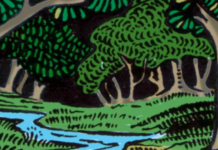
Vampires in Their Own Words: An Anthology of Vampire Voices
, edited by Michelle Belanger
Llewellyn Worldwide, 9780738712208, 245 pp., pp.
Michelle Belanger, perhaps best known for her first book, The Psychic Vampire Codex, serves as editor for this unique anthology. Vampires In Their Own Words is exactly what it sounds like: a collection of essays by various vampires, some identify as psychic or energy vampires, whereas others identify as sanguinarians (vampires who drink blood), and others who fall somewhere between the two.
In her introduction Belanger gives an overview of the myth of the vampire and details her “Awakening” (a term used to denote the starting point of one’s conscious awareness of hir vampiric condition) and process of acceptance. Much of this will be familiar to anyone who’s read her earlier works or listened to Shadowdance, the podcast she co-hosts with Chris Miller.
The rest of the anthology is divided into loose sections written by an impressive cross-section of vampires covering everything from vampire culture, feeding and the ethics surrounding various practices, codes of behaviour and traditions, followed by a section written by those with close ties to the vampire community but who do not consider themselves vampires.
Many of the essays open with explanations on how each individual arrived at their identification with vampirism and their “Awakening” process. The majority of the essays are followed with a definition section, explaining the vampire culture-specific terms used, such as “donor”, “therian”, “kitra”, and numerous others. There is some overlap, but it’s nice to see the range and variety in the answers, which points are emphasized, as it gives a feel for how individual vampires relate to the terms they use.
Naturally, taken as a whole, some of the essays are contradictory, and they’re far from equal in calibre, but such is the nature of anthologies. There are also quite a few that shine, and others which give pause for thought, such as Sylvere ap Leanan’s “American Vampires” where the author rants against the caste- and court-based vampire community structures. She writes, “…we’re Americans. Our nation was founded on the principle that all are equal in the eyes of our Creator and should be acknowledged as such by those around us…Yet, in clubs and on the Internet, we revert to the very societal structure from which our countrymen struggled to free us.” She raises many valid points.
In “Vampire Lifestyle and Culture” Sanguinarius makes a legitimate case for the appropriation of vampire myths in weaving an identity as a vampire lifestyler, writing: “Since we have no culture of our own, historically speaking, we are inventing it for ourselves…In our case, the only “existing cultural heritage” or knowledge base that could be said to exist are the social/cultural aspects of vampiric fiction…”
Though for this occultist, perhaps the most intriguing essay was that written by Alexzandria and James Baker, “The Serpent’s Kiss”, which explored Aleister Crowley’s use of the term “vampire” and explored his relationship with the vampire myth in modern occult views and through his published works.
Vampires In Their Own Words provides a fair range of opinions on what it means to be a vampire, how vampire behaviour ought to be conducted, what the community should look like, and would serve well as a resource for anyone wanting to learn more about the subculture.








